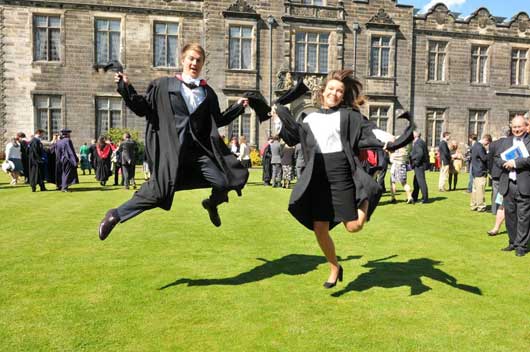Graduation Address – Professor John Anderson

Vice-Chancellor, Colleagues, New Graduates and Friends,
First of all, congratulations! This is a significant rite of passage in which you have been awarded degrees and witnessed the honouring of a distinguished scholar. Now I am the only thing that stands between you and your celebrations, so it is probably not the time to tell you that I am the son of a minister who was brought up on a diet of 50 minutes sermons, and that I spend at least part of my professional life giving 50 minute lectures – so I hope you are in no hurry!
There are certain conventions about a graduation address. It would normally praise you for your achievements and ability to rise above the daily stresses of your study and social life to gain a degree from one of the best universities in the world; it should remind you of the support you have received from your family and friends in getting this far – and praise them for supporting you in this endeavour; it should send you on your way to brilliant careers and fulfilled lives; and it usually asks you not to forget this rather unlikely little university town on the edge of Fife, to keep in touch, and to spread the word about what we do.
Above all, it should be upbeat and uplifting. Well, it should be….so in line with that convention I thought I would start by telling you a cheerful story about poverty, labour camps, and death…
My story is fictional, and comes from a short story by the Russian writer Alexander Solzhenitsyn usually translated as Matryona’s House. The narrator has returned from the labour camps after Stalin’s death and has moved to the village where the widowed Matryona provides him with a place to sleep. Matryona is a poor peasant woman, who has lived through revolution and two wars, has lost her husband, seen six children die in infancy, and now in her early 60s is much put upon by relatives and local authorities. All she has to show for her life is a goat, a lame cat, a decaying hut and 200 roubles to cover her funeral costs. She is a very ordinary Russian peasant, yet over time the narrator begins to grasp that for all her suffering this is a special woman, not a saint by any means, but someone who has in a very real sense been transfigured by her experience of life. At the end of the story she is killed by a train.
As I say, a cheerful tale, that I’ll come back to in a moment. Now clearly this is not an experience that is likely to resonate with you.
I very much hope you will not follow the narrator into a labour camp – though occasionally there have been students I would like to have locked up, and doubtless one or two have reciprocated that feeling about some of us on this platform. Very few of you will experience what Matryona has to endure, though some of you may have jobs that bring you into contact with real need and may involve you seeking to combat poverty and hardship.
But, like her, your futures will have been shaped in part by the experiences you have accumulated so far, in particular by some of the things that have happened in St Andrews. In many ways, and in total contrast to Matryona, you graduating students are privileged people. Not in the sense of the tabloid image of St Andrews, but in terms of what you have experienced here in this small town. For most this is a period you will treasure for the rest of your lives – here you have acquired not just an assorted collection of facts, but an ability to reason and think for yourselves; not just acquaintances but friends (and in some cases partners) who will be close to you in the years to come. Equally, for a few your memories of St Andrews may be more ambiguous. During your time here you have had to cope with trauma or unhappiness of one form or another. Whatever the nature of your experience here it should have given you a better understanding of yourselves – it should have changed and transformed you and given you resources to draw on in the years to come.
This privilege will create numerous opportunities to make successful careers and to make money, but it should also make you thankful and humble. It should engender a desire to put something back into the communities in which you live and work. And in case this is beginning to sound a bit too much like a sermon, I will put it more briefly by stealing the words of BBC journalist Kate Adie. Addressing a graduating class two years ago she said – you should go from here to ‘have fun and do good’.
So where does Matryona fit into all of this. In the story the narrator ends with her funeral, he recounts the hypocrisy and grasping quality of the mourners, and finishes with the comment that ‘we all lived beside her and never understood that she was that special one without whom, according to the proverb, no village can stand. Nor any city. Nor any land’.
We hope you have happy, prosperous and fulfilling lives, and we hope you don’t forget us. But above all we want St Andrews graduates to be noted as the type of people without whom no city, no enterprise, no venture can stand. If you become those people then together we have succeeded. Perhaps this is asking too much and is too idealistic. Maybe, but if we did not aim high this would not be the university it is. So go from this hall cheerfully – if only because this is the last lecture you will hear from us – enjoy your celebrations today, keep in touch, and good luck.
Category University news